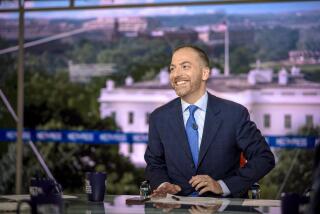Bush Names Campaign Manager as GOP Chairman
- Share via
WASHINGTON — President Bush on Monday tapped Ken Mehlman, a key architect of his reelection campaign, to serve as chairman of the Republican National Committee.
The committee must approve the choice at its winter meeting in January, but it is expected to ratify Mehlman without much dissent.
“When there is an incumbent president, he can pretty much have whoever he wants as the chairman,” said Gary Bauer, a longtime conservative activist.
Mehlman, a close ally of chief White House political strategist Karl Rove, would replace Ed Gillespie, who announced last week that he was resigning his post to return to his lobbying business.
“Ken has a clear vision for making our gains durable while continuing to help expand the message and reach of the Republican Party,” Bush said in a statement.
With the announcement, Bush continued his postelection pattern of elevating loyalists to key positions. He already has named White House counsel Alberto R. Gonzales as his choice to succeed Atty. Gen. John Ashcroft. National security advisor Condoleezza Rice is expected to be named today to succeed Colin L. Powell as secretary of State, and top domestic policy advisor Margaret Spellings is the leading candidate to replace Rod Paige as secretary of Education.
As manager of Bush’s reelection campaign, Mehlman, 38, played a central role in developing the massive volunteer operation that fueled the successful Republican get-out-the-vote drive.
In an interview, Mehlman said that continuing to “energize that grass-roots army” would be one of his top priorities if he was approved as party chairman.
He plans to use the GOP’s list of 7.5 million “e-activists” and 1.2 million volunteers for voter registration and get-out-the-vote activities aimed at the 2006 elections, he said, and also intends to more aggressively enlist them in lobbying for the president’s policy agenda in Congress.
Similar efforts to convert the Democratic National Committee into a lobbying arm of the White House raised controversy among Democrats during Bill Clinton’s presidency, when some elected officials complained that the effort diverted resources from campaigns. But Mehlman said he did not anticipate objections from Republicans.
“Ultimately, the way you do well in the upcoming elections is to deliver for the American people,” he said. “And the way we deliver is on behalf of an agenda that the American people have voted for.”
Mehlman said he also would focus on courting Latinos, African Americans and other nontraditional Republican voters, as well as on expanding efforts to train and mobilize candidates for lower-tier offices -- so that “in 2010 and 2012, the Bush generation is there in Congress and in other positions.”
One senior Republican official described Mehlman as “someone who clearly understands the importance of developing a grass-roots structure and encouraging the involvement of people. Ken understands that we’re strongest when people all across the country feel like they own the party and are organizing the party and are making things happen.”
A graduate of Franklin & Marshall College in Lancaster, Pa., and Harvard Law School and a former aide to Texas Republican legislators, Mehlman was the national field director for the Bush-Cheney campaign in 2000.
He then joined the White House staff, working under Rove as director of political affairs and helping to execute the strategies that led to GOP gains during the 2002 congressional elections.
After a presidential campaign that stressed the importance of generating excitement and turnout among the party base, Mehlman seems unlikely to generate resistance from any element of the GOP coalition.
“My sense is he does understand what the groups are that come together to give the Republicans majority status,” said Bauer, who sought the GOP presidential nomination four years ago. “The campaign had a very good operation to keep in close communication with the base, and presumably Mehlman would bring that to the RNC. So I have not heard any grumbling at all.”
More to Read
Get the L.A. Times Politics newsletter
Deeply reported insights into legislation, politics and policy from Sacramento, Washington and beyond. In your inbox three times per week.
You may occasionally receive promotional content from the Los Angeles Times.










